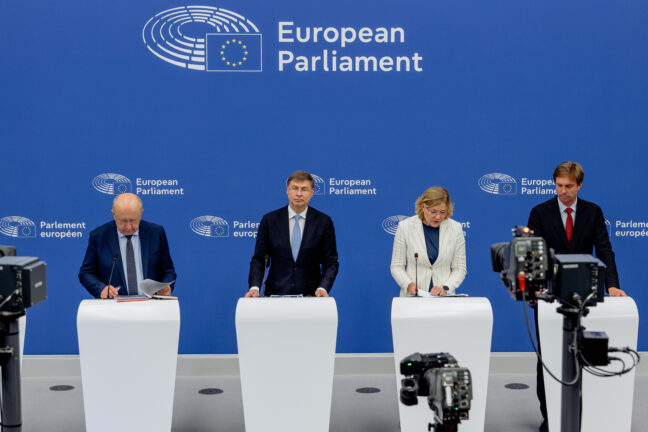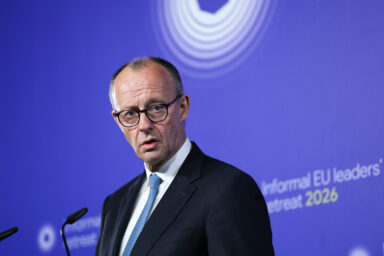The Commission is pushing to bolster the continent’s defence. It enjoys parliamentary support, too. Parts of the plan, however, meet considerable opposition: Ten out of 27 EU member states have balked at the European Defence Industry Programme (EDIP), key part of the effort.
The European Commission proposed measures on Tuesday 17 June to speed up defence investment and production. The plans follow the White Paper on European Defence Readiness by 2030 to make the EU more responsive to today’s security challenges. However, they do not always go down smoothly.
Ten dissenters
This week, the focus of attention shifted to EDIP, a regulation proposed by the Commission to start implementing concrete measures featuring in the European Defence Industrial Strategy. Ten EU member states have spoken against it. “The current wording of the eligibility criteria in EDIP does not reflect reality and the EU’s ambition to achieve defence readiness by 2030. Our concerns focus on the limited flexibility in industrial cooperation with non-associated third countries,” read a statement presented by Bulgaria, Croatia, Czechia, Estonia, Finland, Latvia, Lithuania, Netherlands, Romania, and Slovakia.
EDIS is a regulation to bridge the gap between the ending of the short-term emergency measures and the EU’s defence industrial future readiness. EDIP seeks to put in place the strategy’s specific measures to address security of the defence supply chain and the support of the Ukrainian defence industry. Both saw the light of day in March 2024.
The ten nations assert that EU producers currently cannot provide the weaponry required for effective defence. They emphasise that the bloc “still depends—especially in the short to medium term—on critical components, technologies, and know-how from like-minded third countries, in particular trans-Atlantic allies.”
You might be interested
‘Limited flexibility‘ hurts
The dissenters have called for a relaxation of the EDIP’s “limited flexibility” to enable engagement with advanced weapon manufacturers outside the European Union. This reflects their desire to maintain robust ties with the US defence industry and avoid the pitfalls of Europe attempting to stand alone militarily before achieving adequate preparation.
The dissenting countries maintain that the EDIP must allow for a more realistic approach to defence procurement. Despite their support for strengthening the European Defence Technological and Industrial Base (EDTIB), they express frustration over the limitations that will impair their defence capabilities. They argue that the EU must acknowledge its reliance on third countries for critical military technologies that are now essential.
(The EU) still depends on critical components, technologies, and know-how from like-minded third countries, in particular trans-Atlantic allies. – Statement by ten countries opposing EDIP
The topic will see crunch time on Monday when the EU Foreign Affairs Council convenes. It will address the dissenting memeber states‘ reservations.
For all the ado surrounding it, EDIP has a relatively modest budget of €1.5bn. The Commission, therefore, seeks other avenues of complementing the bloc’s military capabilities. “We facilitate €800 billion in defence investments that Member States urgently need to undertake to ensure European defence readiness by 2030,” said Lithuanian EU Defence Commissioner Andrius Kubilius.
Simplify, simplify, simplify
To encourage investment in the defence sector, the European Commission has decided to simplify the process for approving national state aid measures supporting the expansion of production capacity for defence-related goods and services. These investments are now part of “essential security interest”. As such, they do not de iure distort competition within the internal market. Member states are therefore not required to notify the Commission about such measures, which gives them greater flexibility to invest in both defence capabilities and related services.
Defence Commissioner Andrius Kubilius emphasised the necessity of readiness in today’s security landscape, saying, “The only way to ensure European peace is to make sure we are ready to defend ourselves credibly and quickly.” The Commission asserted in a statement that “for the first time in a generation, the risk of large-scale conventional attack in Europe has reentered the strategic calculus.” It thereby mandates an urgent shift toward a defence-ready posture.
The EU High Representative for Foreign Affairs and Security Policy Kaja Kallas said, on the day the proposal for the simplification of defence was presented, that the EU needs its companies in the sector to be “as flexible as possible” in order to “enable them to provide what we need, when we need it.”
MEPs largely on board
The new simplification package also allows member states to “authorise exemptions at national level for chemicals used in defence supply chains, such as PFAS. It aims to expand national exemptions existing for the defence interests of REACH (the Community Regulation on Chemicals) and in other legislation on chemicals.”
The European Parliament follows the Commission’s defence line. In a non-legislative resolution adopted this week–with 421 votes in favour, 180 against and 55 abstentions–MEPs called for support for projects close to completion to be extended beyond 2026. This is to ensure the completion of key investments foreseen in the National Plan for the Recovery and Resilience (PNRR).
MEPs welcome the possibility of establishing a targeted prioritisation and transfer system after the 2026 deadline. This is to allow the completion of ongoing projects through other funding schemes, including the European Investment Fund and a possible new European Competitiveness Fund.











